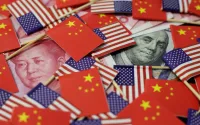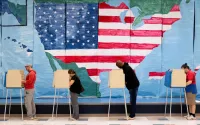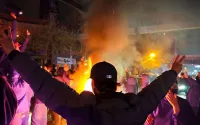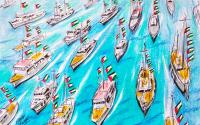March 19, 2002 It is a democratic monarchy: It sells the United States a million-and-a-half barrels of oil a day, at low prices, and spends $10 million a day on high-priced U.S. weapons.It is a monarchy that loves liberty: It prohibits political parties and unions, decapitates or mutilates its prisoners à la the Taliban, and bars women from driving or traveling without the permission of a father or husband.Since May of 2000, Saudi Arabia has been a member of the United Nations Human Rights Commission.This international recognition of the shining virtues of Saudi Arabia, which does so much for the human rights of its 5,000 princes, leads me to propose other awards:1. Let's start by bestowing the World Cup in Representative Democracy on the American oil company UNOCAL. Before getting his current job as president of Afghanistan, the elegant Hamid Karzai worked for this firm, as did Zalmay Khalilzad, Washington's emissary to the new government in Kabul. The rain of missiles that drove out the Taliban has opened the way to representative democracy for the representatives from UNOCAL, who are already busy hammering out plans to realize their old pet project: a pipeline through Afghanistan that would carry Caspian Sea gas to the West via the Arabian Sea.2. The field of contestants is crowded for the Latin American Clean Hands Award. It will be neck and neck all the way, given the number of leaders who have made a killing in the vast privatization raffle of recent years.There is Raul Salinas, brother of the former Mexican president, who won for himself the nickname ''Mr. Fifteen Percent." Carlos Menem, the former president of Argentina, created an Office of Special Affairs solely to collect his commissions. The son of Ecuadorian President Abdala Bucaram threw a party to celebrate his first million. The funds found in one of the bank accounts of Vladimiro Montesinos, right-hand man of ex-president of Peru Alberto Fujimori, would suffice to build 500 schools.And what about Arnoldo Aleman, literally worth his weight in gold? As mayor of Managua and president of Nicaragua, he boosted his fortune from $26,000 to $250 million, according to his ambassador to the European Union, who is very familiar with his dealings. Was it for this that Ronald Reagan dragged one of the poorest countries in the world into bloody full-scale war?3. Might I suggest that the Trophy for Social Responsibility go to Daimler-Chrysler?At last year's Davos Forum--a sort of Porto Alegre Forum in reverse--a director of Daimler-Chrysler delivered the gathering's most applauded speech. Jurgen Schrempp moved the competition by exhorting it to assume ''social responsibility for the businesses in the world today." ''Today,'' he said. The next day his company fired 26,000 workers.4. And for George W. Bush, the Prize for Involuntary Honesty.As we know, the President of Humankind has a few problems with his mouth. Despite the advice from his mother, he sometimes forgets to chew before he swallows. He often gets tangled in his words and inadvertently says what he really thinks. His difficulty of expression works in the service of truth. Last March 2, for example, Bush stated: ''I will carry out this equivocal message to the world: Markets must be open.'' The United States is a closed market, as its agricultural subsidies have jumped seven-fold in the last five years. Meanwhile, in the countries of the South, which are open markets, millions and millions of peasants have been condemned to living like the snail, which can go a year without eating.5. The Prize for the Impunity of Power should go to Newsweek magazine.A few weeks after September 11, this publication ran an article by its star journalist, Jonathan Alter, in which he contemplated torture as the best method to deal with the enemy. Alter took great pains to develop the ideas of President Bush, who had warned in his speeches that from this point on, anything goes.There is nothing new in using the war on Satan and the war on terrorism as alibis for using state terror. From the executioners of the Inquisition to the military personnel trained in torture by the School of the Americas, it is well-known that torture is an inefficient method of extracting information but an extremely efficient way of sowing fear.6. Which brings us to the awarding of the Prize for Economic Dynamism to the industry of fear.Now that almost everything else has been privatized, law and order will be, as well. Crime is on the rise, and people are scared. In Brazil, private security firms constitute an army five times larger than the national armed forces. This is the most dynamic sector of the economy in the most unjust country of the world. In a relentless cycle, Brazil produces injustice, which produces violence, which produces fear, which produces jobs.7. The Medallion for Military Merit must go to Argentine retiree Norberto Roglich.At the beginning of this year, in an open war against the people, the banks of Argentina had confiscated their savings. Roglich, retired, sickly, and desperate, launched an assault against the financial fortress with a grenade in one hand. ''Give me my money, or we'll all blow sky high,'' he demanded. It was just a toy grenade, but they gave him his money. Soon after, he was arrested. The sentence requested was for eight-to-sixteen years in jail--for him, not the bank.8. There's no doubt about who should win the Social Science Award: Catalina Alvarez-Insua, who has defined poverty better than anyone. The poor are the ones who keep their doors locked, she pronounced. If this criterion were applied, the statistics would have to be adjusted to reflect that the number of the poor is far higher than current figures allow.Catalina is three years old. The best age to take a quick look at the world, and see it clearly.Eduardo Galeano, a Uruguayan journalist, is the author of "Upside Down: A Primer for the Looking-Glass World," "Memory of Fire" and "The Open Veins of Latin America." To discuss this Article and other issues please visit the Guerrilla News Forum
Canlı Yayın
Kâinatın tüm seslerine, renklerine, titreşimlerine Açık Radyo...
Ekolojiden siyasete, edebiyattan müziğe Apaçık Radyo'da haftanın öne çıkan gündemleri mail kutunuzda!
İletişim
Açık Medya Yayıncılık A.Ş.
Koltukçular Çıkmazı No 7 İç Kapı No 2
Tophane, Beyoğlu, İstanbul, TR-34425
Telefon: +90 212 343 4040
Faks: +90 212 232 3219
E-posta: [email protected]






